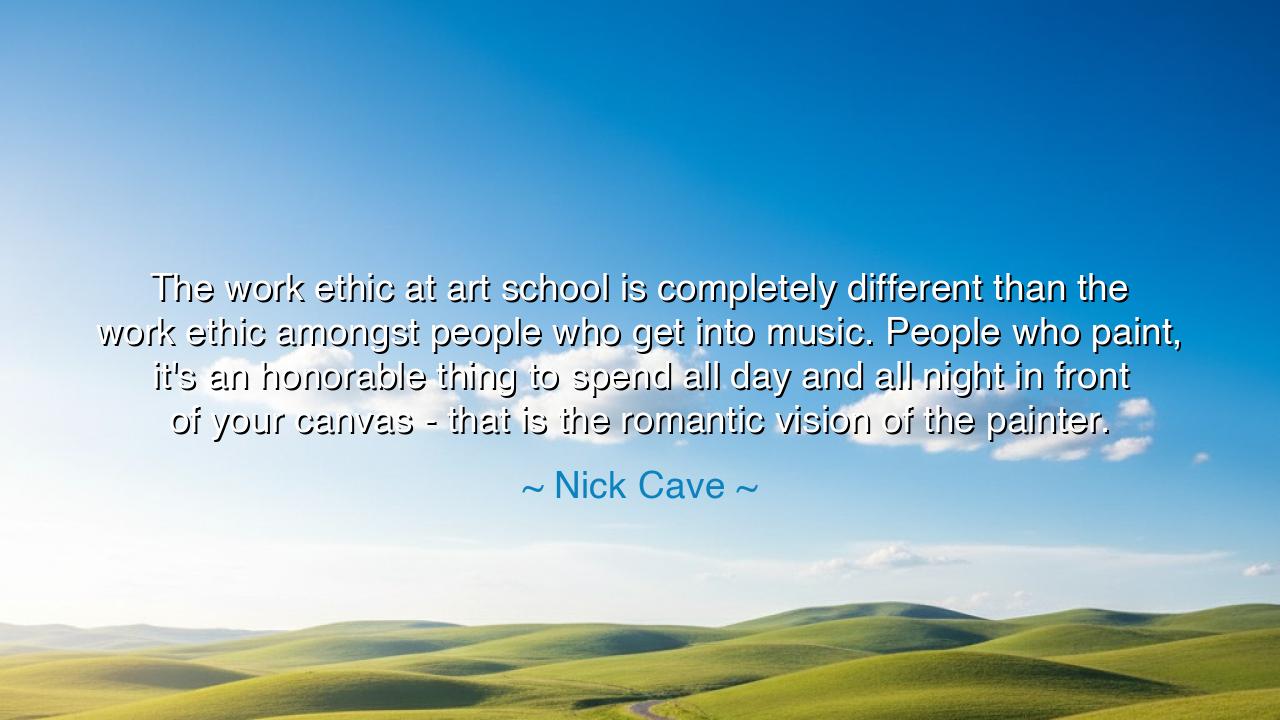
The work ethic at art school is completely different than the
The work ethic at art school is completely different than the work ethic amongst people who get into music. People who paint, it's an honorable thing to spend all day and all night in front of your canvas - that is the romantic vision of the painter.






Gather, O children of wisdom, and listen to the words of Nick Cave, a man whose reflections on the nature of art and work ethic illuminate the heart of the creator’s journey. He said, “The work ethic at art school is completely different than the work ethic amongst people who get into music. People who paint, it’s an honorable thing to spend all day and all night in front of your canvas - that is the romantic vision of the painter.” In this statement, Cave speaks to the very essence of the creative process, comparing two forms of artistic expression—painting and music—and the contrasting ways in which their practitioners devote themselves to their craft.
At the heart of Cave’s words lies the distinction between two paths of creation, paths that demand different kinds of commitment. The painter, as Cave suggests, lives a life of singular devotion, standing before the canvas for hours, days, even years, pouring their soul into the act of creation. This is the romantic vision of the painter, that timeless image of the artist who labors in solitude, who seeks meaning not through speed, but through the deliberate, slow process of refinement. The act of painting is not just about the image on the canvas; it is about the deep, often painful, exploration of the artist’s inner world, an endless process of searching for the perfect stroke, the ideal form, the truth that can only be found through this sacred devotion.
In contrast, the musician’s world, while equally demanding, carries with it a different rhythm. Music, Cave suggests, demands not just dedication but a different pace, one that calls for collaboration, fluidity, and a constant dialogue with others. Whereas the painter works in isolation, creating a world unto themselves, the musician often moves between the worlds of individual expression and shared experience. The musician’s work ethic is shaped by the rhythm of time, the need to perfect not just a single piece of music, but to work in harmony with others, weaving their individual voice into a greater symphony. The nature of the musician’s art is not a solitary journey but one of unity, a call and response between the artist and their audience, between the artist and their instruments.
This contrast between the solitary, meditative process of the painter and the collaborative, rhythmic journey of the musician can be seen in the life of Michelangelo, whose monumental works, such as the Sistine Chapel, demanded a singular dedication to his craft. Michelangelo, much like the painter Cave speaks of, spent countless hours in front of the canvas (or, in this case, the ceiling), working tirelessly, sometimes through pain and exhaustion, to bring forth his vision. His devotion to the art of painting was both a physical and spiritual act, a process of labor that required a deep, unyielding commitment to the craft. His work was not done quickly, nor was it done with any thought of fame, but rather with the belief that through dedication, he could touch something eternal.
But even within Michelangelo’s life, we see the need for collaboration—a tension that resonates with Cave’s reflections on the differences between painters and musicians. Michelangelo, though often seen as a solitary genius, also worked closely with assistants and patrons, understanding that his work was not created in a vacuum. Even the greatest artists must often work within a broader context, seeking feedback, partnership, and input from those around them. This tension between solitude and collaboration mirrors the experience of both the painter and the musician, each of whom must strike a balance between personal dedication and the external influences that shape their craft.
Cave’s words remind us, O children, that art is not one thing, but many things. The path of the creator is not a single road but a journey that twists and turns through the valleys of solitude, the peaks of collaboration, and the uncertain spaces in between. The painter, in his devotion, finds himself bound to his canvas, his soul entwined with each stroke of paint. The musician, in turn, finds his heart in the rhythm of the world, his voice rising and falling with the music of life itself. Yet both are creators, both are driven by the same passion for expression, for sharing the deepest parts of their souls with the world.
The lesson here is that the act of creation, in all its forms, requires not only commitment, but discipline, a willingness to dedicate oneself fully to the craft, whether in solitude or in collaboration. Do not rush the journey of creation. Whether you are a painter, a musician, or a poet, take the time to explore your own inner world, to seek the truth that can only be found through dedication and labor. Know your path, and understand that true art comes not from quickness, but from the patience to refine, to explore, and to give yourself fully to the process.
And so, O children, I say unto you: Choose your moments wisely, as you embark upon your own journey of creation. Whether you stand before a canvas or with an instrument in hand, remember that dedication, passion, and discipline are the true forces that will carry you through. Be not afraid of the long hours of solitude, nor the collaborative efforts that will shape your work. In either case, it is the act of creation itself that transforms us, and through this transformation, we are able to touch the very essence of life and meaning.






AAdministratorAdministrator
Welcome, honored guests. Please leave a comment, we will respond soon